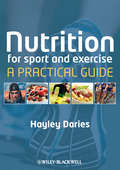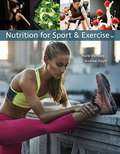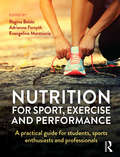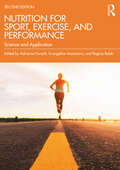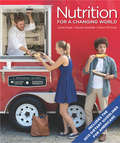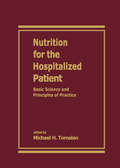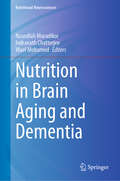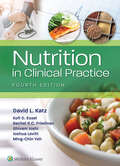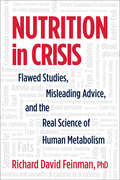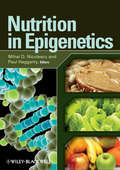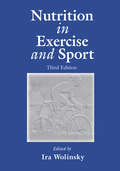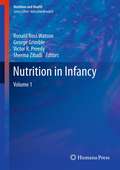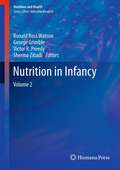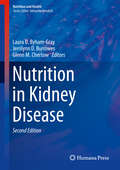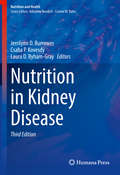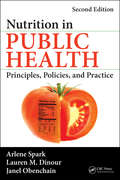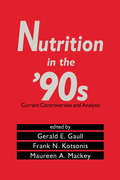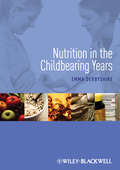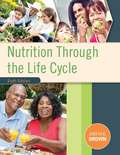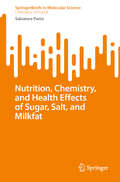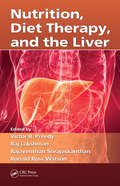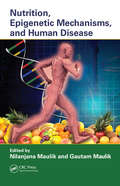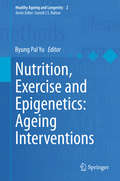- Table View
- List View
Nutrition for Sport and Exercise
by Hayley DariesFood and drink choices before, during and after training and competition have a direct impact on health, body mass and composition, nutrient availability and recovery time, and an optimal diet can significantly improve exercise performance. Nutrition for Sport and Exercise outlines the fundamental principles of nutrition in relation to sport and exercise and then applies these principles through practical tools such as food and nutrient lists, recipes and menu options. This practical guide translates the athlete's goals into achievable strategies and shortens the gap between theory and practice. Equipping the reader to successfully implement dietary changes, this is an invaluable resource for athletes, sports physicians and undergraduate students of nutrition and sport and exercise science courses.Special FeaturesDedicated chapters on the impact and relevance of specific nutrients and food groupsIncludes recipes and menu optionsCovers the area of sport and exercise nutrition with an evidence-based approachConcise and accessible, combining theory and practice
Nutrition for Sport and Exercise
by Marie Dunford J. Andrew DoyleTeaching you how to interpret and apply scientific data, Dunford/Doyle's NUTRITION FOR SPORT AND EXERCISE, 4th Edition, emphasizes the scientific basis for sports nutrition recommendations and highlights current research studies of trained athletes. The text helps you translate current nutrition recommendations and guidelines into specific plans for the appropriate amount and type of foods, beverages and/or supplements to support training, performance and recovery--for a variety of sports. Detailed explanations of the connection between exercise and nutrition help you reach the ultimate goals--optimal performance and health. Giving you in-depth insight, entire chapters are devoted to diet planning, disordered eating and exercise patterns in athletes and lifelong fitness and health.
Nutrition for Sport, Exercise and Performance: A practical guide for students, sports enthusiasts and professionals
by Regina Belski Adrienne Forsyth Evangeline MantziorisNutrition before, during and after training or a sporting event can improve the comfort, energy and performance of athletes of all levels, from elite to recreational, as well as providing long-term health benefits. Nutrition for Sport, Exercise and Performance offers a clear, practical and accessible guide to the fundamentals of sport and exercise nutrition. The expert authors begin by explaining key principles, including understanding energy systems, exercise physiology and metabolism. They cover the basics of digestion, absorption and nutrition; examine the key macronutrients and micronutrients essential for performance; and discuss the process of dietary assessment. Part 2 goes on to explore in detail nutrition for pre- and post-training, hydration, the use of supplements and body composition, and provides guidance on developing plans for both individual athletes and teams. The final component examines specific nutrition issues and special needs, including working with elite athletes, strength-and-power athletes, young, older and disabled athletes, endurance sports, GI disturbances and rehabilitation issues. Cultural issues are also explored, including diets for vegan and vegetarian athletes, and religious perspectives and requirements. Featuring contributions from a range of sport and exercise nutrition professionals and including practical diet plans, diagrams and the latest research and evidence throughout, this is a core reference for undergraduates, nutritionists and trainers.
Nutrition for Sport, Exercise, and Performance: Science and Application
by Regina Belski Adrienne Forsyth Evangeline MantziorisNutrition for Sport, Exercise, and Performance offers a clear, practical, and accessible guide to building a comprehensive understanding of sport and exercise nutrition from leading experts in nutrition and exercise science. Nutrition before, during, and after training or a sporting event can improve the comfort, energy, and performance of athletes of all levels, from elite to recreational, as well as providing long-term health benefits. As such, nutrition is a key element of an athlete’s health and performance strategy, whether competing recreationally or at an elite level.Split into three parts, this new and revised edition of Nutrition for Sport, Exercise, and Performance provides an evidence-based introduction to nutrition for sport, exercise, and performance. Part I focusses on nutrition and sport science by explaining key principles underpinning sports nutrition science, including energy systems, exercise physiology and metabolism, and the digestion and absorption of macronutrients and micronutrients essential for performance and discusses factors influencing dietary intake, energy availability, and the process of dietary assessment. Part II is focussed on nutrition for exercise, pre- and post-training, hydration, supplements, and body composition measurement and modification. The final part (Part III) focusses on applied sports nutrition for a range of sports and athletes. This second edition delivers new insights into working with female athletes, occupational athletes, and athletes in contemporary sports including sport climbing, surfing, skateboarding, and breaking.Featuring contributions from a range of sport and exercise nutrition professionals with practical sports nutrition strategies and the latest evidence and practice guidelines, this is a core reference for undergraduate students, sports professionals, and aspiring athletes alike.
Nutrition for a Changing World
by Jamie Pope Steven Nizielski Alison MccookIn this breakthrough introductory text, educators Jamie Pope and Steve Nizielski, and science writer, Alison McCook use real stories—about real people and real science—to teach the basic concepts of nutrition. Each chapter reads like Scientific American-style article, with compelling reporting and beautifully designed infographics providing a context for the scientific content. Unique chapters on timely topics (diabetes, cardiovascular disease, plant-based diets, fat- and water-soluble vitamins, dietary supplements, and the college years) exemplify the book’s thoroughly contemporary approach to nutrition science. Nutrition for Changing World is also the only textbook for the course to offer automatically graded dietary analysis activities using the USDA’s open-access SuperTracker. These exercises are in LaunchPad, a dedicated online course space that compliments the text to provide students with a fully integrated print/digital learning experience.
Nutrition for the Hospitalized Patient: Basic Science and Principles of Practice
by Michael H. TorosianThis work offers detailed coverage of the biochemical and metabolic framework that forms the basis for the current theory of nutrition support. It presents analyses of the practical aspects of providing nutrition to hospitalized patients, and examines nutrition support in critical care and sepsis, cancer, gastrointestinal disease, cardiac and pulmo
Nutrition in Brain Aging and Dementia (Nutritional Neurosciences)
by Indranath Chatterjee Wael Mohamed Nasrollah MoradikorThe book provides a thorough examination of the crucial connection between diet, cognitive aging, and dementia using a multidisciplinary approach. It dives into the complex area of neurology, illuminating different forms of dementia, their underlying pathophysiology, and the risk factors related to them. It explains the symptoms, diagnoses, and therapies for dementia. The book explores the effects of dietary elements like protein, micronutrients, and superfoods, demonstrating their potential to protect cognitive function. Additionally, it discusses how critical vitamins like D and B12, natural antioxidants, and trace minerals affect dementia risk and development. The book explains the use of conventional herbal medicine as a supplementary strategy to dementia therapy, evaluating its potential efficacy and safety. The book provides evidence-based advice to professionals, physicians, researchers, nutritionists, and healthcare professionals to understand the nutritional requirements to control dementia.
Nutrition in Clinical Practice
by David Katz Yeh Ming-Chin Joshua Levitt Kofi D. Essel Shivam Joshi Rachel Summer Clair FriedmanDesigned for busy clinicians struggling to fit the critical issue of nutrition into their routine patient encounters, Nutrition in Clinical Practice translates the robust evidence base underlying nutrition in health and disease into actionable, evidence-based clinical guidance on a comprehensive array of nutrition topics. Authoritative, thoroughly referenced, and fully updated, the revised 4th edition covers the full scope of nutrition applications in clinical practice, spanning health promotion, risk factor modification, prevention, chronic disease management, and weight control – with a special emphasis on providing concisely summarized action steps within the clinical workflow. Edited by Dr. David L. Katz (a world-renowned expert in nutrition, preventive medicine, and lifestyle medicine) along with Drs. Kofi D. Essel, Rachel S.C. Friedman, Shivam Joshi, Joshua Levitt, and Ming-Chin Yeh, Nutrition in Clinical Practice is a must-have resource for practicing clinicians who want to provide well-informed, compassionate, and effective nutritional counseling to patients.
Nutrition in Crisis: Flawed Studies, Misleading Advice, and the Real Science of Human Metabolism
by Richard David FeinmanAlmost every day it seems a new study is published that shows you are at risk for diabetes, cardiovascular disease, or death due to something you&’ve just eaten for lunch. Many of us no longer know what to eat or who to believe. In Nutrition in Crisis distinguished biochemist Richard Feinman, PhD, cuts through the noise, explaining the intricacies of nutrition and human metabolism in accessible terms. He lays out the tools you need to navigate the current confusion in medical literature and its increasingly bizarre reflection in the media.At the same time, Nutrition in Crisis offers an unsparing critique of the nutritional establishment, which continues to demonize fat and refute the benefits of low-carbohydrate and ketogenic diets—all despite decades of evidence to the contrary. Feinman tells the story of the first low-carbohydrate revolution fifteen years ago, how it began, what killed it, and why a second revolution is now reaching a fever pitch. He exposes the backhanded tactics of a regressive nutritional establishment that ignores good data and common sense, and highlights the innovative work of those researchers who have broken rank.Entertaining, informative, and irreverent, Feinman paints a broad picture of the nutrition world: the beauty of the underlying biochemistry; the embarrassing failures of the medical establishment; the preeminence of low-carbohydrate diets for weight loss, diabetes, other metabolic diseases, and even cancer; and what&’s wrong with the constant reports that the foods we&’ve been eating for centuries represent a threat rather than a source of pleasure.
Nutrition in Critical Care
by Peter Faber Frca Fficm Mario Siervo Msc RphnThe association between poor nutrition and disease is well established. Integrating nutritional sciences into clinical practice offers a valuable tool to improve patient care and prognosis, particularly within the critical care environment where nutrition is often overlooked. However, optimizing nutritional support offers a safe and simple adjunct to more expensive and technologically challenging treatments for these complex patients. This volume provides comprehensive guidelines for the nutritional support of critically ill patients and is valuable reading for doctors, nurses, dieticians and practitioners working within the critical care environment. It begins by discussing nutritional physiology and patient assessment, providing an essential foundation for planning and managing the dietary requirements of critically ill patients. Internationally-recognized authors present evidence-based guidelines for managing various groups, including surgical patients, patients with burns, and patients with renal failure. The implications of enteral vs. parenteral nutrition, timing of nutritional support, therapeutic strategies, and management of complications are discussed.
Nutrition in Epigenetics
by Mihai D. Niculescu Paul HaggartyThe study of epigenetics, or how heritable changes in gene expression are regulated without modifying the coding DNA sequence, has become an increasingly important field of study in recent years. Rapid developments in our understanding of the way in which gene function is modulated by the environment has revolutionized the way we think about human development and health. Nutrition in Epigenetics reviews the latest research looking at the interaction between genes and nutrients and the role they play together in maintaining human health. Nutrition in Epigenetics is divided into two primary parts. The first part provides key principles such as epigenetic mechanisms, developmental epigenetics, and the role of epigenetics in disease. The second part looks specifically at the application of epigenetics to the field of human nutrition. Chapters review the role of specific nutrients in modulating epigenetic status and the effect on health and disease. Nutrition in Epigenetics is an indispensable resource for researchers, professionals and advanced students with an interest in human nutrition, epigenetics, and biomedical research.
Nutrition in Exercise and Sport, Third Edition
by Ira WolinskyThe third edition of Nutrition in Exercise and Sport has been updated and expanded to include the latest developments in the field. This third edition of a bestseller among sports nutrition and health professionals now fully discusses the role of exercise and nutrition in both wellness and in disease prevention. In addition, new chapters on the history of sports nutrition, antioxidants, vegetarianism, the young athlete, the older athlete, the diabetic athlete, the physically disabled athlete, sports specific nutrient requirements, and body composition changes have been added. Top sports nutrition practitioners and exercise scientists have contributed chapters that provide practical nutritional guidelines for those engaged in various types of physical performance. This book is a one-volume library on sports nutrition for research scientists in applied sports nutrition, dietitians, exercise physiologists, sports medicine physicians, coaches, trainers, athletes, and nutritionists. The first two editions of this book have been widely used in sports nutrition courses. Nutrition in Exercise and Sport is the standard in the field.
Nutrition in Infancy: Volume 1
by Victor R. Preedy Ronald Ross Watson Sherma Zibadi George GrimbleNutrition in Infancy: Volume 1 is a very useful resource for all clinicians treating and preventing nutritional problems in infants. This volume covers a wide range of topics that support wellness in infants through the prevention and treatment of infectious diseases, malnutrition, and developmental and genetic abnormalities. A variety of chapters deal with nutrients for infants with disabilities, surgery, and other special needs. <P><P> Special emphasis is provided for clinicians treating the millions of children in developing countries whose death is promoted by undernutrition or malnutrition. The next sections discuss the health benefits of supplementation and breast feeding and methods to improve use of berast feeding and it's duration. In Nutrition in Infancy: Volume 1, all of these facets of nutrition and nutritional therapy are covered in a precise and practical way. The latest developments in diagnostic procedures and nutritional support are also included. Written by a group of international experts, this volume is an indispensable new reference for clinicians with an interest in the nutrition and health of pregnant mothers and their infants.
Nutrition in Infancy: Volume 2
by Victor R. Preedy Ronald Ross Watson Sherma Zibadi George GrimbleNutrition in Infancy: Volume 2 is a very useful resource for all clinicians treating and preventing nutritional problems in infants. This volume covers a wide range of topics that support wellness in infants through the prevention and treatment of infectious diseases, malnutrition, and developmental and genetic abnormalities. A variety of chapters deal with nutrients for infants with disabilities, surgery, and other special needs.<P><P> The sections in this volume discuss GI Tract Considerations, Formulas, probiotics, hormones and lipids in the health and disease of infants, and the growth and development of infants. In Nutrition in Infancy: Volume 2, a wide range of nutritional and food related therapies to prevent or ameliorate disease, growth retardation and promote health are outlined. The latest developments in diagnostic procedures and nutritional support are also included. Written by a group of international experts, this volume is an indispensable new reference for clinicians with an interest in the nutrition and health of pregnant mothers and their infants.
Nutrition in Kidney Disease
by Laura D. Byham-Gray Jerrilynn D. Burrowes Glenn M. ChertowNutrition in Kidney Disease, Second Edition addresses the relationships between nutrition and (1) normal kidney function and disease, (2) the progressiveness of chronic kidney disease (CKD) and strategies to prevent further compromise, and (3) the treatment and management of kidney failure especially during medical crises, such as acute kidney injury and its consequent nutritional therapies (e. g. , enteral and parenteral nutrition). Demographic patterns, trends and outcomes in the current health care systems are explored in the United States and abroad. Disease prevention and management are presented over the entire lifespan, beginning with pregnancy, followed by infancy, childhood, adolescence, and adulthood, concluding with the elder years. Foundations for clinical practice are established by devoting a complete section towards conducting a comprehensive nutritional assessment, comprising of anthropometric, biochemical, clinical, physical parameters and psychosocial concerns unique to the kidney disease population. Nutritional therapy is also discussed across the spectrum of kidney disease, and pertinent aspects critical to successful management of disorders and conditions, such as bone disease, obesity, and nephrotic syndrome are explored. Nutrition in Kidney Disease, Second edition highlights cutting edge research in regards to exercise and functional outcomes, malnutrition and the inflammatory response, experimental therapies, and the use of complementary and alternative medicine, with a special emphasis on relevant preventative strategies.
Nutrition in Kidney Disease (Nutrition and Health)
by Laura D. Byham-Gray Jerrilynn D. Burrowes Csaba P. KovesdyThis third edition of this text is organized into seven sections that address the educational needs of dietitians around the world who seek current information about nutritional management of chronic kidney disease (CKD). Part I addresses the differences in the epidemiology of CKD and renal replacement therapy worldwide, such as environmental, ethnic, cultural, political and macroeconomic factors. Part II includes a thorough review of the components of the nutrition assessment, which includes information about psychosocial issues affecting nutritional status in kidney disease and drug-nutrient interactions, and parts III and IV review preventative strategies for common disorders associated with CKD such as hypertension, type 2 diabetes, obesity and cardiovascular disease are provided, and current evidence-based treatment recommendations for the nutrition management of non-dialyzed, dialyzed and transplanted adults are addressed. Part V presents the nutritional concerns of CKD populations with special needs (i.e., pregnancy, infancy, childhood, adolescence and the elderly). The nutrition management of other disorders associated with kidney disease are covered in Part VI; these include protein-energy wasting and the inflammatory response, bone and mineral disorders, nephrotic syndrome, nephrolithiasis, and acute kidney injury. Lastly, Part VII is devoted to cutting-edge research on topics of concern in nutrition in kidney disease such as the gut microbiome including pre- and probiotics, appetite regulation, advanced glycation end products, physical activity and structured exercise, and dietary patterns including plant-based diets. When appropriate, the new clinical practice guidelines in nutrition for individuals with CKD are integrated into the chapters. The third edition of Nutrition in Kidney Disease will be a highly informative resource for nephrologists, nutrition scientists, nutritionists, and researchers and students whose research, practice, and education includes nutrition and kidney disease.
Nutrition in Lifestyle Medicine
by James M. RippeThis newest addition to the Nutrition and Health series focuses on nutrition's key role in lifestyle interventions to prevent and manage diseases. The book pays particular attention to nutritional considerations related to obesity, diabetes, and cardiovascular disease. Edited by cardiologist, Dr. James Rippe, a well-known expert in the nascent specialty of Lifestyle Medicine, Nutrition in Lifestyle Medicine will also focus on a variety of specialized areas such as nutrition for athletes and physically active individuals, hydration, and nutrition throughout the life cycle (spanning from children to individuals over the age of 60). In addition, chapters will be included on controversies in nutrition, such as health effects of added sugars and saturated fatty acids in the diet. Finally, specialized chapters will be included in such areas as nutrition for women, nutrition for men, nutrition for latinos, the use of supplements, communication about nutrition, public policy issues, and the interface between nutrition and physical activity. Lifestyle Medicine, supported by the American Journal of Lifestyle Medicine, Dr. Rippe's textbook Lifestyle Medicine (CRC Press, 2013) and American College of Lifestyle Medicine (ACLM), is a new national medicine specialty that stresses the use of lifestyle interventions in the treatment and management of disease. Its practitioners effectively manage medical treatments alongside the lifestyle interventions, for example lowering insulin treatment for patients with diabetes, reducing the dose of anti-hypertension medications for people with hypertension, and prescribing certain medical interventions that aid in smoking cessation.
Nutrition in Public Health: Principles, Policies, and Practice, Second Edition
by Arlene Spark Lauren M. Dinour Janel ObenchainThis second edition of a bestseller, Nutrition in Public Health: Principles, Policies, and Practice focuses on the role of the federal government in determining nutrition policy and influencing practice. Beginning with an overview of public health principles, the book examines the application of nutritional policy to dietary guidance, health promot
Nutrition in the '90s: Current Controversies and Analysis
by Gerald E. Gaull Frank N. Kotsonis Maureen A. MackeyIn ten essays commissioned by the NutraSweet Company, contributors from the health and food sciences explain to the general consumer that nutrition is not as simple as some people make it out to be, and there are still questions about sugar, cholesterol, obesity, and other topics. Annotation copyrig
Nutrition in the Childbearing Years
by Emma DerbyshireIn a field saturated with complex and conflicting information, this exciting new book covers information about nutrition before, during and after pregnancy in a clear and user friendly style. The author addresses all the major aspects of the subject, moving from fertility and preparing the body for pregnancy, through to nutrient metabolism, diet and pregnancy outcome, weight gain, special needs, and postpartum changes and nutrition. This guide's evidence based approach will appeal to nutritionists and dietitians, and to many other health professionals who work with women in their childbearing years, including midwives, nurses and family practioners. Each chapter includes a useful set of appendices covering dietary requirements, nutritional composition of key foods and weight gain guidelines, as well as application in practice sections and a summary of key points.
Nutrition through the Life Cycle
by Judith BrownUnderstand how diet impacts your health with NUTRITION THROUGH THE LIFE CYCLE, Sixth Edition! Based on the latest research available, this text explores the many ways nutrition impacts your growth, development, and normal functioning as you progress through each stage of life, along with some common ailments that can result from nutritional deficits. Packed with current research and resources to help you build your knowledge base, the text alternates between "normal" nutrition and clinical applications, to address each life stage completely. NUTRITION THROUGH THE LIFE CYCLE, Sixth Edition also shares insights of expert authors -- from registered dietitians and other clinical professionals to teachers and researchers -- to help you grasp major concepts and see the truly critical role of nutrition in human health today.
Nutrition, Chemistry, and Health Effects of Sugar, Salt, and Milkfat (SpringerBriefs in Molecular Science)
by Salvatore ParisiThis book covers sugar, salt and milk fat from a chemical perspective, and presents an overview of the role of these ingredients in our food, focusing on their flavors, satiety-inducing properties, nutritional impact, and health effects. The book begins with a chapter devoted to the chemical composition of these taste enhancers and satiety-inducing components, followed by a chapter that sheds light on the persuasive tactics employed by the food industry and their impact on consumer behavior, ultimately discussing the complex relationship between marketing strategies and public health. In Chapter 3, the author presents case studies and explores the nutritional requirements of these ingredients, while considering their physiological effects ad potential implications for human health. In Chapter 4, the author evaluates current consumption patterns and their implications, analyzing trends, policies, and opportunities to shape healthier dietary choices. The book closes with a chapter devoted to the effects of glucose, sodium and cholesterol deficiency, where the author discusses the consequences of imbalanced intake or deficiencies in these ingredients and outlines their impact on human health as well as evidence-based recommendations for keeping a balanced diet. Researchers, scholars, and students in the fields of food science, nutrition, chemistry will understand the appeal of this book.
Nutrition, Diet Therapy, and the Liver
by Victor R. Preedy Ronald Ross Watson Rajaventhan Srirajaskanthan Raj LakshmanWell-illustrated throughout and with in-depth analyses, Nutrition, Diet Therapy, and the Liver provides a holistic understanding of the causative elements that precipitate liver disease and the nutritional factors and regimens that reverse deteriorating hepatic function. This up-to-date resource also incorporates emerging fields of science and sign
Nutrition, Epigenetic Mechanisms, and Human Disease
by Nilanjana Maulik Gautam MaulikAs nutrition research is shifting its focus from epidemiology and physiology to effects of nutrients at the molecular level, a uniquely tailored diet that corresponds to the demands of our genetic signature is emerging as an indispensable need. Using high-throughput genomic tools, nutrigenomics unravels the influence of micro- and macronutrients as
Nutrition, Exercise and Epigenetics: Ageing Interventions
by Byung Pal YuThis book focuses on the three most important aspects of ageing research: nutrition, physical exercise and epigenetics. The contributors discuss ways that age-related epigenetic imprints such as DNA methylation and histone acetylation are modified by these two interventions. The emphasis on epigenetics helps to illuminate the underlying mechanisms of anti-ageing interventions, as ageing and disease are predominately epigenetic phenomena. Among the highlights are chapter-length discussion of such topics as: how anti-inflammatory action of calorie restriction underlies the retardation of ageing and age-related diseases (Chapter 3); epigenetic modification of gene expression by exercise (Chapter 5); the role of functional foods and their bioactive components in bone health (Chapter 8); and an account of the first decade of a study of calorie restriction in nonhuman primates, conducted by the National Institute on Ageing.
